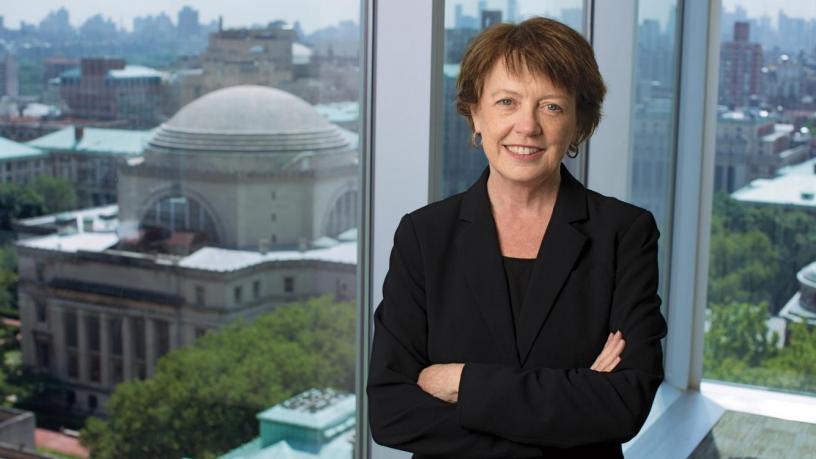Letter from Dean Mary C. Boyce

Engineering and applied science is entering another great stage of discovery with advances in new materials. Our inclination to define eras by their signature materials—the Bronze Age, the Iron Age—shows their importance to civilization and its progress. In this issue, we look at some of the faculty who are pioneering new tools and methods, working across departments and with interdisciplinary centers, to uncover new capabilities in everyday matter and create the new materials, processes, and devices that will define our future.
Once again we highlight several faculty who are bringing our Columbia Engineering for Humanity vision to life—from a new method to target and treat cancer tumors with programmed bacteria, to research in neuroscience that could lead to cohesive and high-performing human-robot teams.
We also feature a Q&A with Yannis Tsividis, the Edwin Howard Armstrong Professor of Electrical Engineering, who was recently elected to the National Academy of Engineering. An expert in integrated circuit design, he built the first integrated MOSFET operational amplifier in 1976 and, like the man for whom his chair is named, is a pioneer in his field who has made an indelible mark on our students and our School.
I truly believe that excellence attracts excellence, and the new faculty members joining us this fall are an impressive group. Their strengths and interests span robotics, genomics, design, data science, human-computer interaction, artificial intelligence (AI), tissue engineering, and sustainable development, to name just a few. One of our new professors, Harry West, will be establishing his popular Human-Centered Design class as a regular course offering. Design thinking elevates our students’ ability to identify the real needs of the “customer” in a challenge and then bring their talents to create or cocreate a solution. We are delighted to add more opportunities for students to engage with concepts around design thinking and entrepreneurship in and outside the classroom.
To further support student learning, we have also significantly expanded our Makerspace from 650 square feet to 3,000— complete with a full wood and metal shop, 3D printers, laser cutters, electronic workbenches, and a water jet cutter—with plans to add artificial and virtual reality capabilities. In the spirit of “making,” this summer our students will compete in the Formula SAE trials in the electric vehicles category. This is the first time our students have built an electric car for this national automotive design competition. We look forward to watching their progress in the coming year.
One of the big questions of our time is the role of AI. We profile alum Apoorv Agarwal MS’08, PhD’14, who is the CEO and cofounder of Text IQ. This start-up uses AI-driven software to help government agencies and highly regulated enterprises scan thousands of documents for pertinent information. Agarwal also gives talks on AI in which he discusses its ethical considerations and how they should inform the way AI systems are designed.
As much as technology like AI advances and enables new breakthroughs, it also raises profound social, economic, and moral questions. The next generation of engineers must continue to be as grounded in ethics as they are in mathematics. Building on our long-standing ethics curricula, several faculty members are dedicating courses, curriculum, and research projects addressing digital privacy, AI, the surveillance economy, the methodologies behind statistics, and more.
Finally, this year marks a milestone in our efforts to attract talented women to engineering. The incoming class of 2023 is 50% female, and our total graduate enrollment is over 35% female, making us one of the leaders in graduate female enrollment by percentage among the top engineering programs in the country. Our incoming students join a dynamic and enthusiastic community of scholars and innovators. I am thrilled that so many young, gifted engineers are choosing to further their education at Columbia Engineering.
Mary Cunningham Boyce
Dean of Engineering
Morris A. and Alma Schapiro Professor
As much as technology like AI advances and enables new breakthroughs, it also raises profound social, economic, and moral questions. The next generation of engineers must continue to be as grounded in ethics as they are in mathematics.
